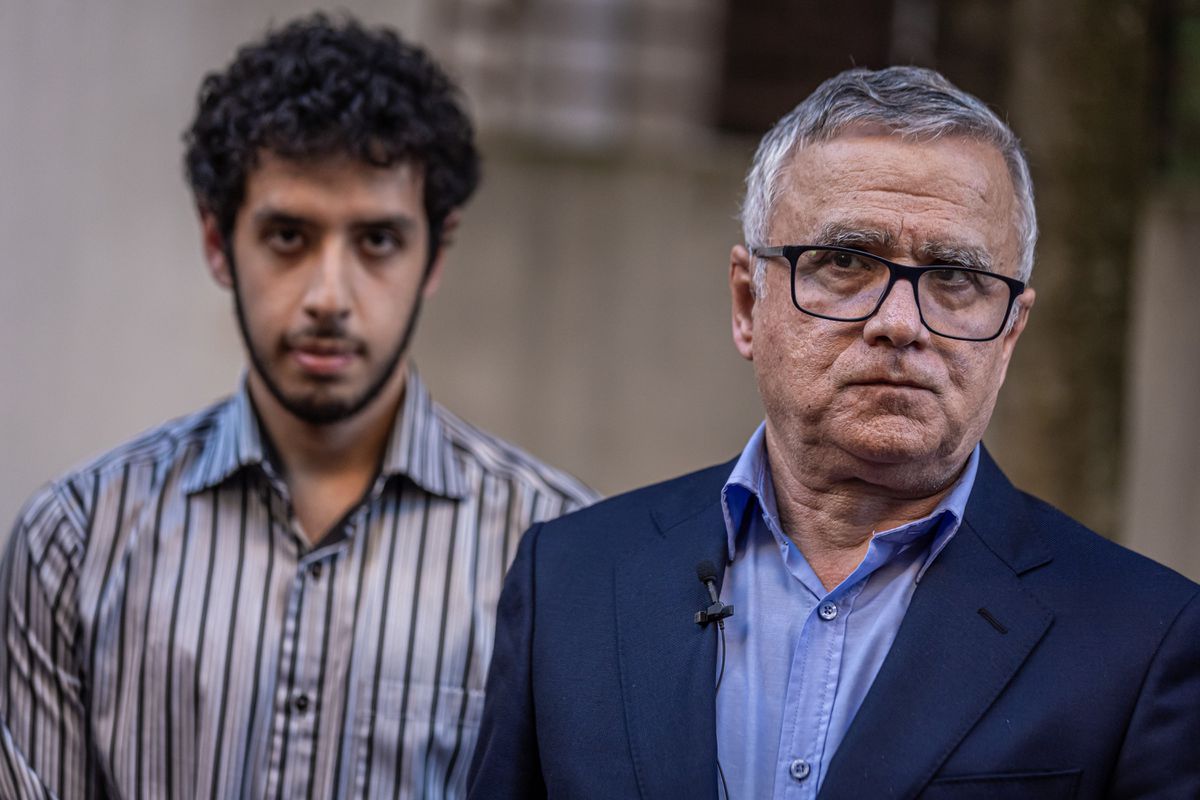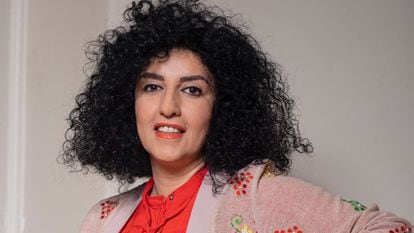
The husband of the activist who won the Nobel Prize argues that this award boosts the struggle of the Iranian women who participated in protests against the Islamic Republic
Iranian Narges Mohammadi, 51, who won the Nobel Peace Prize on October 6, knows what her 16-year-old twins, Kiana and Ali, look like now thanks to cell phones, videos and photos. It has been eight years since she has seen her children in person and 19 months since the human rights advocate has even been allowed to hear their voices on the phone in Tehran’s Evin Prison, where she is serving a prison sentence of over 10 years. Mohammadi has spent the past 12 years in and out of prison. In that time, her husband, Taghi Rahmani, 64, has been her voice in the West; he, too, spent 14 years in the Iranian regime’s prisons. This newspaper spoke with Rahmani on October 9 in a video call from Paris, where he lives in exile with his children. In our conversation, he emphasized how this Nobel Peace Prize in recognition of his wife’s struggle will also serve to “boost the ‘Women, Life and Freedom’ movement.” That was the slogan of the protests against the Iranian regime on September 16, 2022, set off by the death in police custody of Mahsa Yina Amini, a 22-year-old woman who had been arrested three days earlier for wearing the mandatory veil incorrectly.
Question: How did your wife react when she heard that she had won the Nobel Peace Prize?
Answer: Narges [Mohammadi] found out that she had been awarded the Nobel Prize on Friday [October 6] and she [reacted with] great joy. Her father told her on the phone and another prisoner’s husband told her, but also, curiously, she found out through a government TV channel, which often criticizes Narges and other opponents. When the West gives an award like this to a dissident, the regime always says that human rights are being politicized and that is their version… They don’t threaten you directly by saying ‘we are going to increase your sentence’ because you have won this award, or something like that, but there is a veiled threat.
Q. Do you have any hope that she’ll be released, as the president of the Nobel Committee requested?
A. In a letter, forty prisoners who are imprisoned with her have asked that she be released, but the important thing — and that’s the joy that this prize represents — has nothing to do with whether Narges is released or not. The important thing is that the whole world will know about her struggle now. The award adds a lot of strength to her demand for freedoms, for the respect of human rights, now. The important thing is that the world will pay more attention to what is happening in Iran. This award is a boost to Narges’s struggle.
Q. Has the award been a setback for the Iranian regime?
A. Of course it has, but that is a consequence, not the motivation or the objective of the Nobel Prize. This prize hurts the Islamic Republic because there has been a revolution in Iran, a movement in which over 500 people have lost their lives [according to Iranian human rights organizations], many others have lost their eyes [protesters were blinded in one or both eyes by security force gunfire] and over 20,000 have been arrested. Narges is a symbol of all that. This award recognizes her sacrifice, what she has done for over 25 years and how she has supported this movement [the protests] from jail, but it is also an award for the protesters.

Q. What has Iranian society’s reaction to her Nobel Prize been like?
A. So far, people’s reaction has been good. Even Farah Diba [the widow of Iran’s last Shah, Mohammed Reza Pahlevi] congratulated Narges. The only ones who haven’t congratulated her are the small group of Iranians who support the Islamic Republic. Apart from the Iranian regime and the monarchists [supporters of the reinstatement of the Pahlevi dynasty] and the exception of Farah Diba, all the opposition groups have considered this Nobel Prize to be well-deserved. For example, Narges has been congratulated by the teachers’ and other workers’ unions. That is relevant, because these people are inside Iran and have the capacity to mobilize a lot of people. The ones who matter are those who are inside, those groups have the power to get people out on the streets.
Q. What is the situation in Iran like today?
A. Iranians are still protesting; women are protesting; on social media, everybody is protesting. When even the country’s reformists, who are part of the system, are happy with Narges receiving the Nobel Prize, that means that discontent with the regime continues and is widespread. And in that way, we have already won. It is true that any revolution has ups and downs, and now we are at a lower point. Iranians continue with their civil disobedience against the regime, as seen with the women who take off their mandatory hijab. The movement is still going on, but it is going on underground. When we have all the country’s strong unions showing that discontent and they have a lot of people behind them, we see the support that these protests continue to have. That’s why, for us, the congratulatory wishes for Narges’s Nobel that came from inside the prison, from the imprisoned union leaders or from the unions, are the ones that matter. For a country to rise up, it has to rise up from within. The West will come after that.
Q. The protests in Iran don’t have a leader.
A. Opposition leadership has to be accepted within the country [a reference to the Alliance for Democracy and Freedom in Iran, an attempt by part of the Iranian diaspora to rally the opposition last February that fell apart soon after], and that has not happened. Moreover, the protests in Iran are a new model of revolution with which we are not familiar. We also don’t know exactly what is going on in Iran. We would only know if there was a referendum on the regime. There, we would see the Islamic Republic’s support or lack thereof.
Q. The Islamic Republic is increasing its repression of those who disobey the veil law.
A. Actually, it is no longer like it was in Iran years ago, when if you missed a few strands of your headscarf, the morality police would immediately arrive and rebuke you. Now, they are so desperate that there have been policemen who tell women to at least put a string [or] a small cloth on their heads, whatever, so they can argue that these Iranian women are obeying the [regime’s] rules and the mandatory hijab law. Two years ago [before the demonstrations], 75% of Iranian women no longer agreed with the mandatory hijab. I have two sisters, one wears it and the other doesn’t, but even the one who does [wear a hijab] doesn’t agree with it being compulsory. The veil is a symbol of domination. This protest movement is so important that even some ayatollahs who support the regime do not agree with forcing women to wear the headscarf.
ELPAIS International












 Posted in
Posted in 











